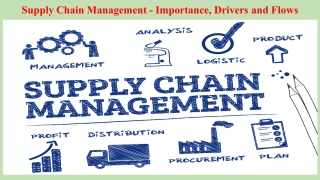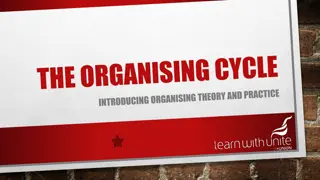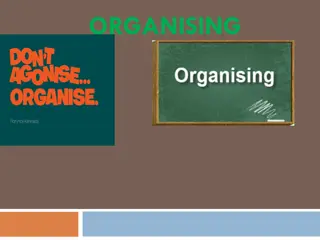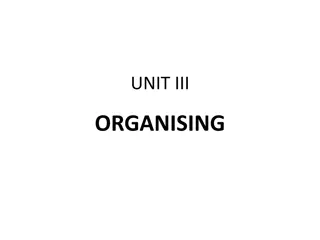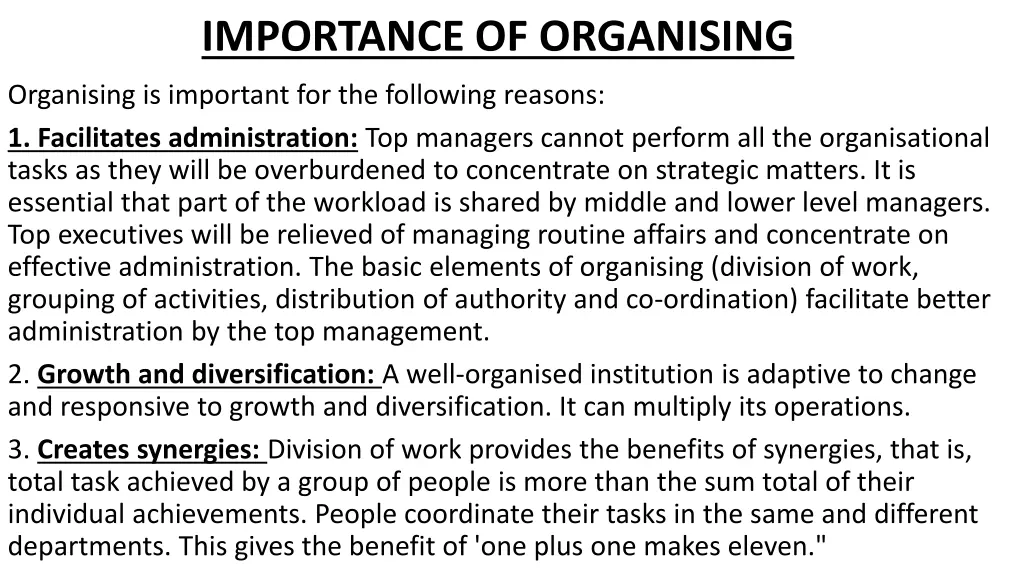
Importance of Organising in Effective Administration and Growth
Organising plays a crucial role in effective administration and growth of an organization by facilitating management delegation, creating synergies, establishing accountability, leveraging technology, enhancing communication, fostering creativity, improving interpersonal relationships, facilitating coordination, and promoting teamwork. A well-organised structure enables efficient functioning, adaptability to change, and optimal use of resources, ultimately contributing to the organisation's success.
Download Presentation

Please find below an Image/Link to download the presentation.
The content on the website is provided AS IS for your information and personal use only. It may not be sold, licensed, or shared on other websites without obtaining consent from the author. If you encounter any issues during the download, it is possible that the publisher has removed the file from their server.
You are allowed to download the files provided on this website for personal or commercial use, subject to the condition that they are used lawfully. All files are the property of their respective owners.
The content on the website is provided AS IS for your information and personal use only. It may not be sold, licensed, or shared on other websites without obtaining consent from the author.
E N D
Presentation Transcript
IMPORTANCE OF ORGANISING Organising is important for the following reasons: 1. Facilitates administration: Top managers cannot perform all the organisational tasks as they will be overburdened to concentrate on strategic matters. It is essential that part of the workload is shared by middle and lower level managers. Top executives will be relieved of managing routine affairs and concentrate on effective administration. The basic elements of organising (division of work, grouping of activities, distribution of authority and co-ordination) facilitate better administration by the top management. 2. Growth and diversification: A well-organised institution is adaptive to change and responsive to growth and diversification. It can multiply its operations. 3. Creates synergies: Division of work provides the benefits of synergies, that is, total task achieved by a group of people is more than the sum total of their individual achievements. People coordinate their tasks in the same and different departments. This gives the benefit of 'one plus one makes eleven."
4. Establishes accountability: When every person knows his superiors and subordinates, the organisation can function efficiently. Establishing limitations in the area of operations defines people's accountability to their immediate boss which gears the organisation towards its broader goals. 5. Optimum use of technology: It is the age of technological developments. Organisations not having well-developed technology will not be able to compete in the market. Well-organised structures enable the organisations to optimally use and update their technology and remain competitive in the dynamic market conditions. 6. Facilitates communication: Communication is the essence of organisation. Efficiency of organisation depends upon how well organisational members communicate with each other. A well-designed system of communication (vertical and horizontal) is facilitated through effective organising efforts of top executives.
7. Facilitates creativity: Creativity means creating something new. It develops new ways of doing the things. A sound organisation enables the top management to improve the ways of doing things by delegating routine affairs to people down the scalar chain. It creates a sense of achievement amongst managers that provides moral boost for further creative thinking. 8. Improves inter-personal relationships: A sound organisation structure ensures that workl is divided into well-defined jobs and assigned to people according to their abilities and skill Placing the right person at the right job ensures job satisfaction and morale boost of employer This improves inter- personal relationships amongst people working in the organisation, 9. Facilitates coordination: Well-defined objectives and plans can fail if organisational activities are not coordinated in a unified direction. A well designed organisation structure promote order and system in its activities. It coordinates work of people at different levels in different departments. People work along pre-defined dimensions and harmonise individual goals wh organisational goals, internal organisational environment with the external environment and financial resources with non-financial resources.
10. Facilitates teamwork: Though people are responsible for specific tasks assigned to them they work collectively as a team and optimise the use of scarce organisational resources t achieve the organisational goals. Organisation, thus, facilitates teamwork. Rather than viewing organisational goals from personal perspectives, they view them from group perspectives Organisational goals satisfy individual goals. 11. Facilitates control: Organisation provides sound direction to activities and ensures that people work according to plans. This facilitates control and promotes organisational goals Objectives are determined and regular feedback ensures conformance of actual performance to targeted performance. 12. Increase in output: Sound organisation divides activities into various departments(production, marketing etc.). These departments specialise in their tasks and increase organisational output. Specialisation is an important contribution of organisation that promotes
13. Optimum allocation of resources: Organising promotes optimum allocation of resources. Resources are allocated over different departments (production, marketing, personnel etc ) higher output in the order of priority. People are assigned jobs they are best suited for All activities are assigned to all people in the organisation. There is no duplication of work. Organising, thus, avoids overlapping of activities to ensure that collectively, people working in different departments perform activities that contribute to organisational goals.

